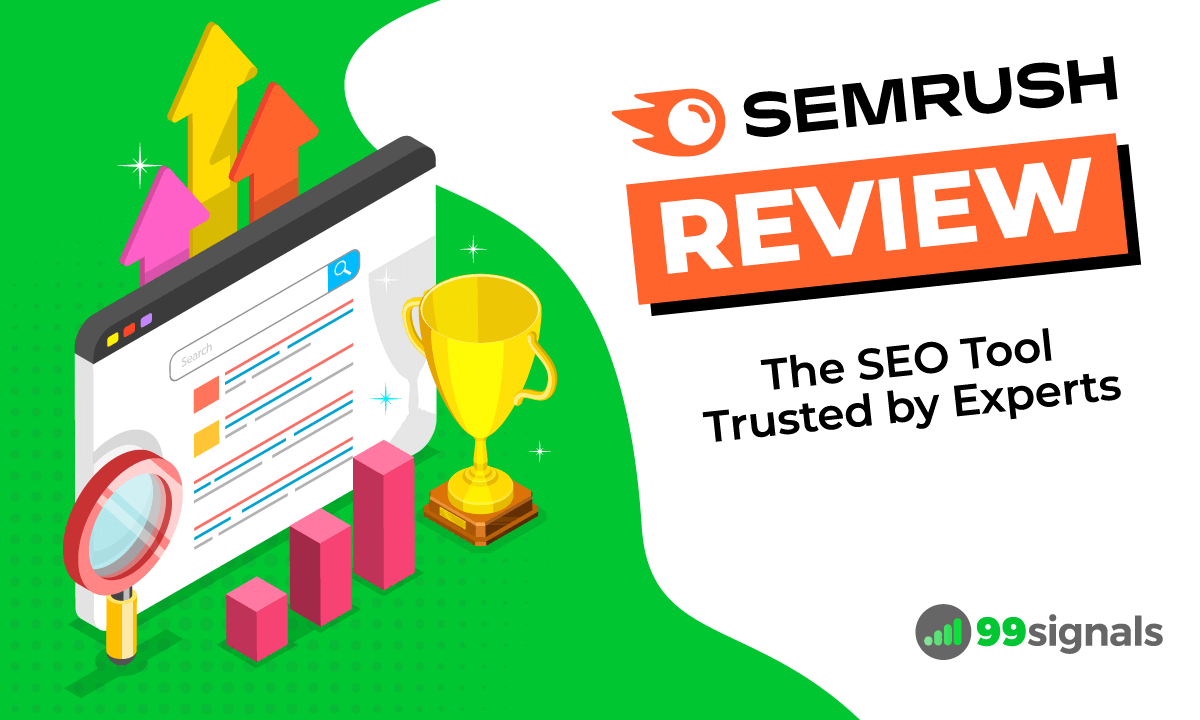
If you've been a frequent reader of my blog, then by now you'd probably know how much I love using Semrush. It's my go-to software for keyword research, competitor analysis, on-page analysis, technical SEO fixes, and more recently, even social media benchmarking and scheduling.
That said, in recent times, I've found myself spending a considerable amount of time using other SEO analysis tools.
All of these these tools are fantastic and offer their own unique benefits, but
Why?
Because
Having used it extensively at my agency for clients from different industries, Semrush is truly the Swiss army knife of keyword research and competition analysis.
It is also the preferred SEO tool of marketing experts around the world and once you start using the tool, it's easy to see why.
Before we jump into the nuts and bolts of
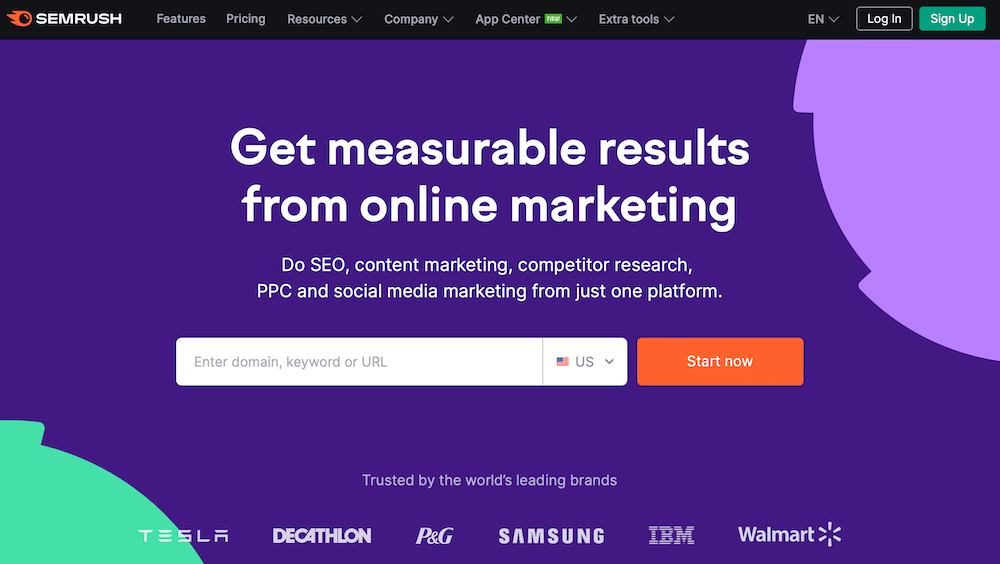
Semrush was founded in 2008 by a small group of SEO and IT specialists who wanted to create the ultimate online marketing tool. A tool that could provide relevant and accurate keyword research and competitor analysis data to make the marketplace a level playing field for businesses of all sizes.
Over a decade later, the team achieved precisely that with
I first became aware of
My team and I were mostly using Moz Pro at the time and were mostly dissatisfied with the results we were getting. I go into specific details as to why in this Semrush vs Moz comparison post here.
As a result, I signed up for a free trial of Semrush and was immediately swept off my feet with the tool's functionalities. First and foremost,
Next, by using
Needless to say, I canceled my Moz Pro subscription and signed up for Semrush's Pro plan.
These days, when I have a call scheduled with a prospective client, I prepare myself by using
Yes, you could argue that you can do this manually, but it'd take a massive amount of your time, and time, as we all know, is money. Especially at a bootstrapped agency like ours.
Furthermore, the data you obtain through
If you're reading this
Important note: You'll probably need to access
Try
In this
- Comparison of
Semrush 's Pricing Plans - Top 6
Semrush Features - Ease of Use
- Customer Support
- Customer Feedback and Sentiments
- How
Semrush Compares with Other SEO Tools
Let's get started!
Feel free to jump to any section of this review using the links in this TOC:
Table of Contents
Semrush Review: Semrush Pricing Plans
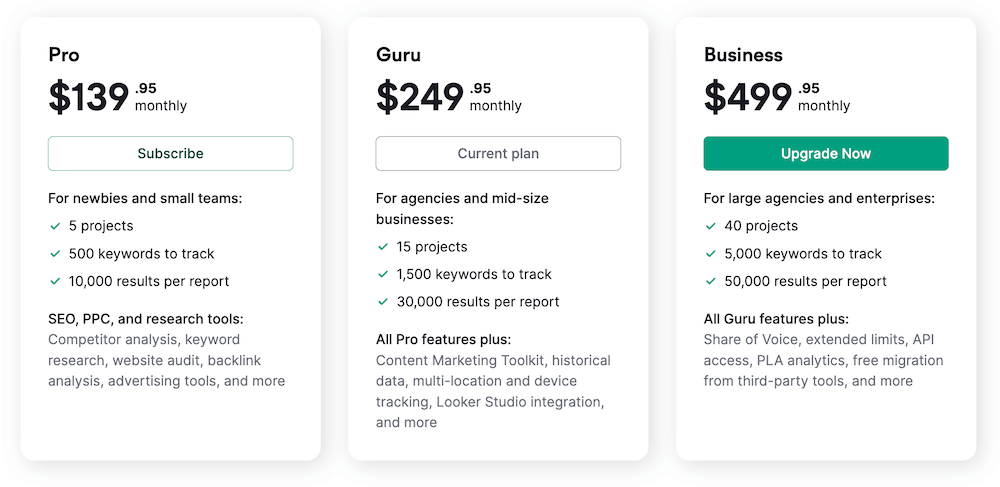
If you'd like to dominate search rankings in your niche and find out what your competitors are up to, you've got to be willing to invest a decent amount of money in a good, reliable SEO tool.
There are no two ways about it.
Despite increasing the price of all their plans in mid-2023,
Semrush offers three monthly pricing plans:
- Pro – $139.95/month (Ideal for beginners and bloggers)
- Guru – $249.95/month (Ideal for small business owners and solopreneurs)
- Business – $499.95/month (Ideal for marketing agencies and marketing teams in big companies)
All three are recurring subscriptions.
If you're managing 1-3 sites, I'd recommend you sign up for the Semrush Pro plan. If you run an agency and deal with multiple clients and projects, then perhaps the Guru plan might be the right fit for your requirements.
Try
Semrush Review: Top 6 Semrush Features
Semrush provides an extensive suite of tools and features, which I've thoroughly explored in previous blog posts, specifically addressing its SEO, competitive analysis, and content marketing tools. You can check out this in-depth Semrush tutorial to get a breakdown of all the top features and tools in the
For the purpose of this review, however, I'll focus on the most useful features and tools in
1. Analyze Your Website
Before starting your competitive analysis, it's always necessary to see how your site is performing on various parameters.
Here are the 3 most important things you should know about your site:
- Top organic keywords
- Organic search positions
- Total number of backlinks
Semrush helps you gather all this important information within a matter of minutes.
The Domain Overview report from
Navigate to:
Semrush Dashboard > Competitive Research > Domain Overview
Enter your domain in the search bar and hit the "Search" button.
The Overview report will provide a quick breakdown of your website's performance, highlighting key metrics like traffic from organic and paid searches, backlinks, organic keywords, paid keywords, and more.
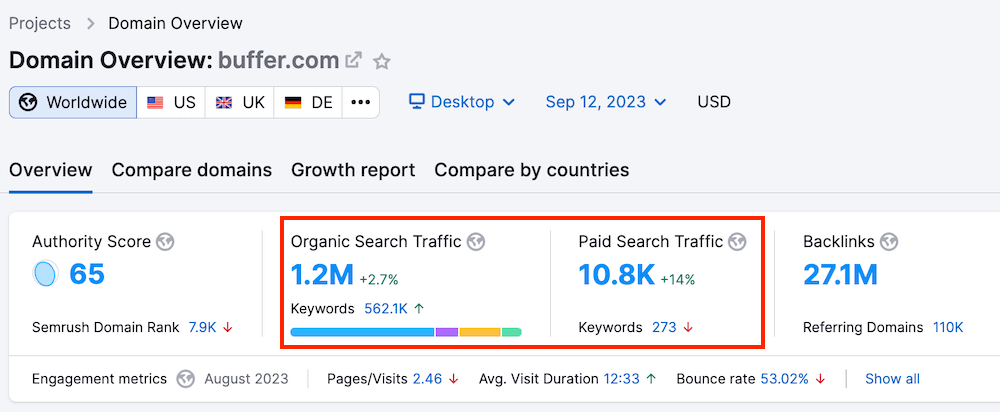
Next, visit "Organic Research" from the sidebar menu to obtain data on your site's organic keywords, estimated organic traffic, organic keywords trend, top keywords by intent, and more.
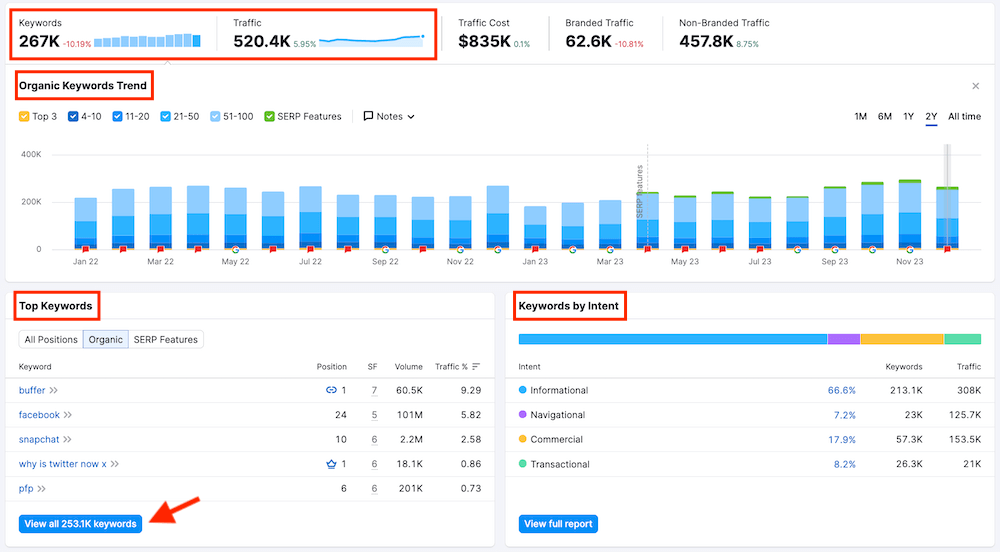
In a similar vein, you can use the Domain Overview tool to analyze your competitors' websites to unravel their organic and paid search strategies.
To view your backlinks, click on the number of backlinks or referring domains in the Domain Overview report.
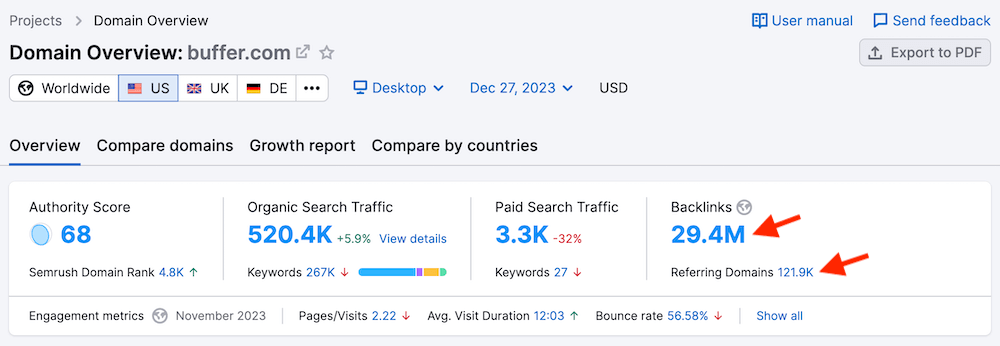
Here you can see your site's backlink profile, the number of referring domains, types of backlinks (text, image, form, etc.) and a percentage split of follow vs nofollow links.
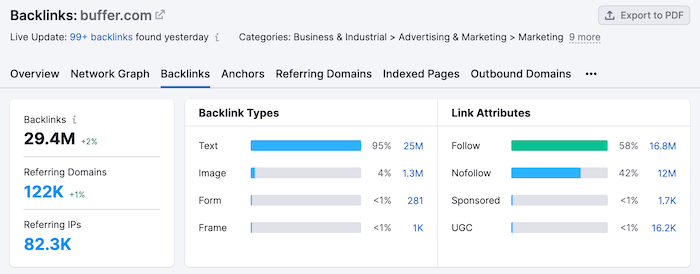
For all of the above, you can export the results into an Excel, CSV, or PDF file for later use.
If this is the first time you're using
2. Identify Your Organic Competitors
Identifying your organic competitors is one of the chief elements involved in dominating search results.
The aim here to understand what your competitors are doing and then do it even better.
To identify your organic competitors, navigate to:
SEO Dashboard > Competitive Research > Organic Research
Enter your domain in the search bar and in the Organic Research Overview report, scroll down until you find the "Main Organic Competitors" widget to view your top 5 organic competitors.
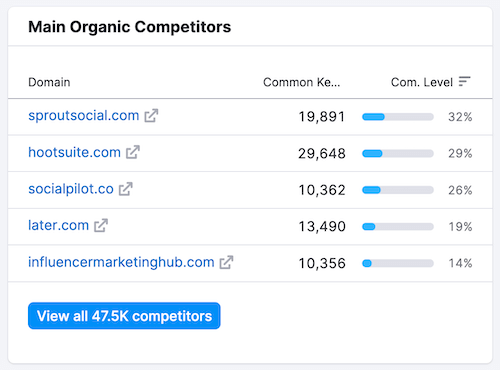
To delve deeper into your organic competitors, either click the "View all" button located below the widget or go to the "Competitors" tab in your Organic Research report.
You'll first view the Competitive Positioning Map, a visual representation of where your website stands amongst your competitors.
In the map, you'll notice bubbles in different positions based on organic keywords and organic traffic.
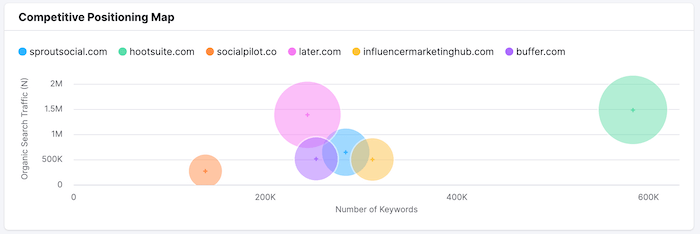
The more keywords a site ranks for, the more to the right the site will appear on the map. Similarly, sites that receive more organic traffic will appear higher on the map.
When you hover over each of the bubbles, you can see their organic keywords and traffic.
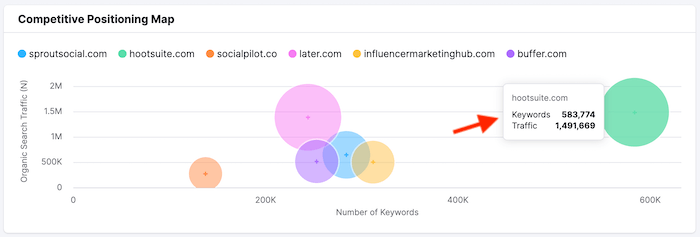
When you scroll down, you'll find the organic competitors table.
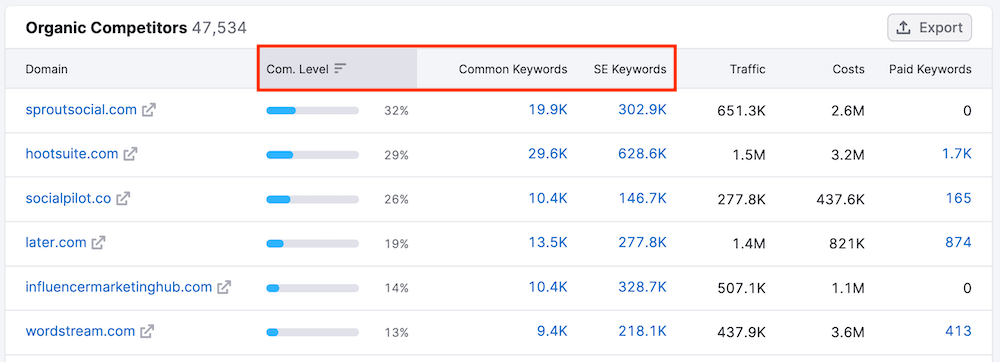
Don't be intimidated by the massive number of competitors you'll see here. Pay close attention to these metrics:
- Competition Level
- Common Keywords
- SE Keywords
These three metrics will reveal your closest competitors and these are the sites you'd want to outrank in search engines.
3. Keyword Research
Despite having a plethora of features and over 40 tools to fine-tune your digital marketing,
To get a complete breakdown of
For this review and for the sake of brevity, I'll quickly highlight a few key keyword research features.
There are 3 primary keyword research tools in the
- Keyword Overview – use it to get a quick summary of your target keywords' monthly search volume, keyword difficulty, and other important keyword metrics.
- Keyword Magic Tool – use it to generate a ton of unique keyword ideas for your seed keywords.
- Topic Research Tool – use it to generate a long list of fresh topics for your next piece of content.
To start the keyword research process in
Semrush will then quickly pull out an overview report for your keywords, featuring all the critical keyword metrics and some top keyword variations based on your seed keywords.
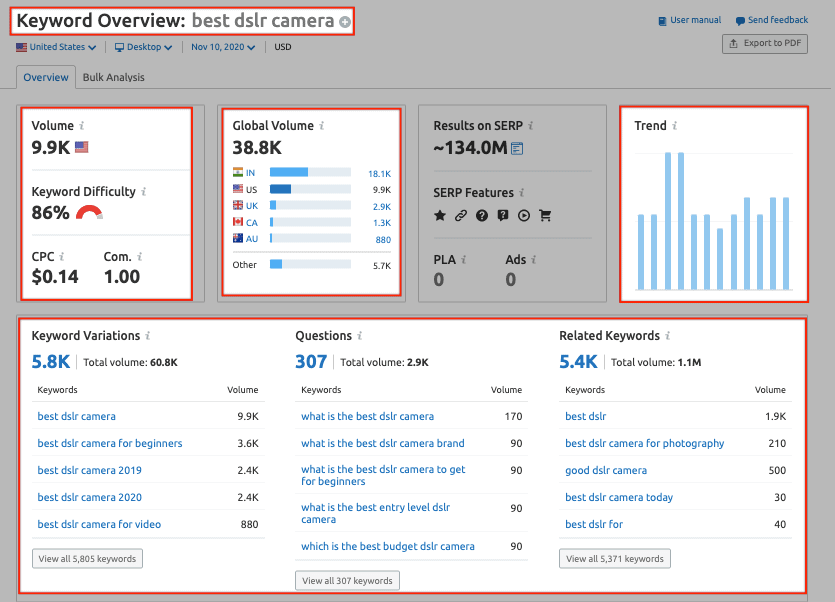
Pay special attention to search volume, keyword difficulty, and the trend graph.
To view more keyword variations for your target keywords, hit the "View all" button below the list of keywords in the "Keyword Variations" section.
This will open up
This is just a quick glimpse into
4. Do a Site Audit and Fix Errors
The site audit functionality in Semush helps you do a diagnostic check of your website in order to identify and fix the most troubling on-page SEO and technical SEO issues with your site.
To do a site audit on
Select the number of pages you'd like SemrushBot to crawl, skip all other steps for now, and click on "Start Site Audit."
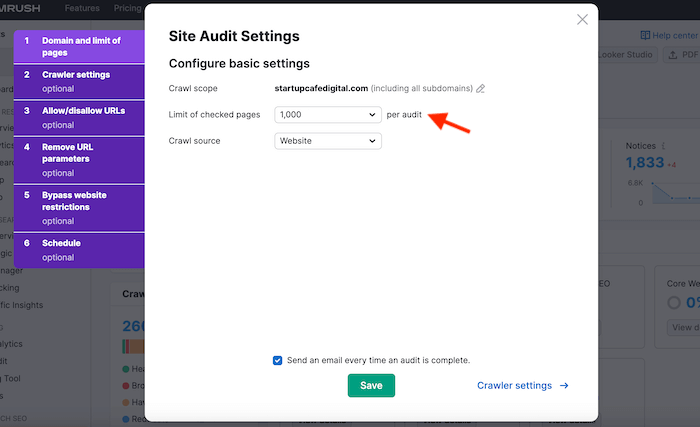
This may take a few minutes, depending on the number of pages you select.
Once the audit is complete, Semrush will display a report that will show the overall SEO health of your site in percentage and highlight errors and warnings that may be hurting your SEO.
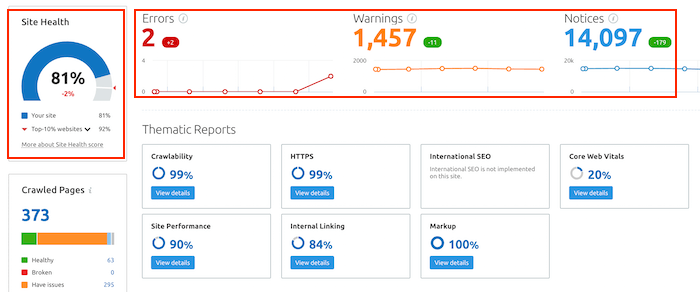
Errors highlighted in red are the most critical SEO problems your site is facing at the moment and the ones you should start fixing right away.
To explore more features in the
5. On Page SEO Checker
On Page SEO Checker is a highly underrated
With On Page SEO Checker, you can promptly check to see if your content complies with all the on-page and off-page SEO elements, like your content's relevancy and quality, backlinks' trustworthiness and reputation, page title, H1, H2 tags, and meta description.
To access the tool, navigate to:
SEO Dashboard > On Page & Tech SEO > On Page SEO Checker
Select any of your active projects on this page and configure your domain. Add the pages and keywords that you'd like to optimize and hit "Collect Ideas."
Each of these pages will be analyzed and you'll receive instant recommendations on how to optimize them.

You just have to click on the "Ideas" button next to the page you'd like to optimize to view suggestions from
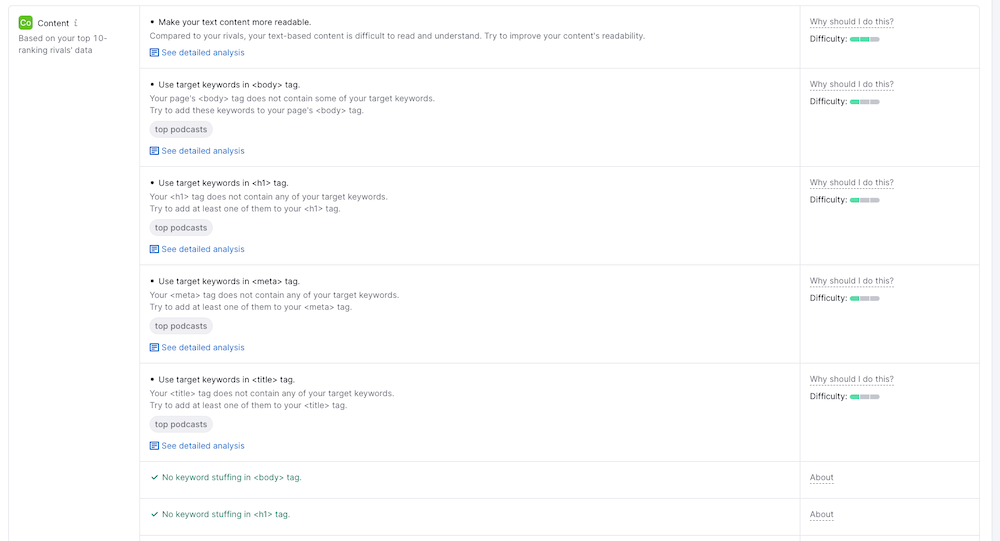
If you'd like recommendations on your site's user experience signals, connect your Google account with
This will allow
6. PPC Analysis
I wouldn't be doing
Monitoring your competitors' PPC ads is a vital step in staying one step ahead of your competition.
With Semrush, you can keep a tab on the keywords your competitors' are targeting, their rankings in SERPs, and even have a sneak peek at their ad copies.
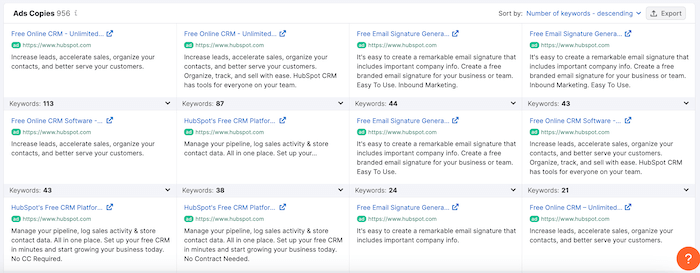
This way you can polish your own PPC ad copies and optimize your landing pages for maximum impact.
Semrush Review: Ease of Use
Semrush is easy to use with a clean user interface. Nevertheless, it may take some time for you to acclimatize yourself with the interface, especially if you're migrating from tools like Moz or SpyFu. Plus, it's loaded with features, so it can be a bit overwhelming at times.
That said, there is absolutely no reason to worry as
You can also tune into their webinars (both past and upcoming) to keep yourself updated with all the new features and functionalities.
Semrush Review: Customer Support
Customer support can make or break a company's reputation. Needless to say, it's one of the most important factors involved in a company's success.
This is especially true in the case of services such as
Semrush provides support mainly through their comprehensive knowledge base and email. They also organize webinars on a regular basis where they unveil new features and provide some actionable tips to improve your SEO and PPC.
Here are links to resources which you should definitely check out to learn new ways to use
Side note: I held a webinar on the topic 'Actionable Affiliate Marketing Tips' in collaboration with
Semrush Review: Customer Feedback and Reviews
Semrush continues to be a popular tool among marketing experts and professional bloggers. Top industry influencers like Brian Dean from Backlinko, Neil Patel, and Larry Kim feature
At the same time, it has near-perfect ratings on review sites such as G2, TrustRadius, and Capterra.
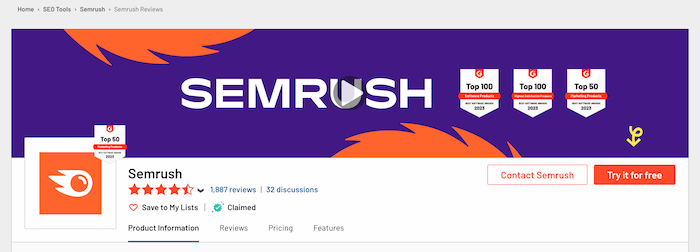
Here's how
- G2 – 4.5/5 (2,000+ reviews)
- TrustRadius – 8.5/10 (700+ reviews)
- Capterra – 4.7/5 (2,200+ reviews)
[The above ratings were last updated in July 2024]
How Semrush Compares with Other SEO Tools
In this section, I'll quickly compare
Semrush vs Ahrefs: Is Semrush Better than Ahrefs?
If you want an in-depth analysis of these two tools, I'd urge you to check out this Semrush vs Ahrefs comparison post.
I personally prefer
When it comes to pricing,
In contrast,
Having said that, both tools are phenomenal. So if you have the budget, subscribe to both tools. If not, I'd highly recommend
Here's a quick breakdown of how
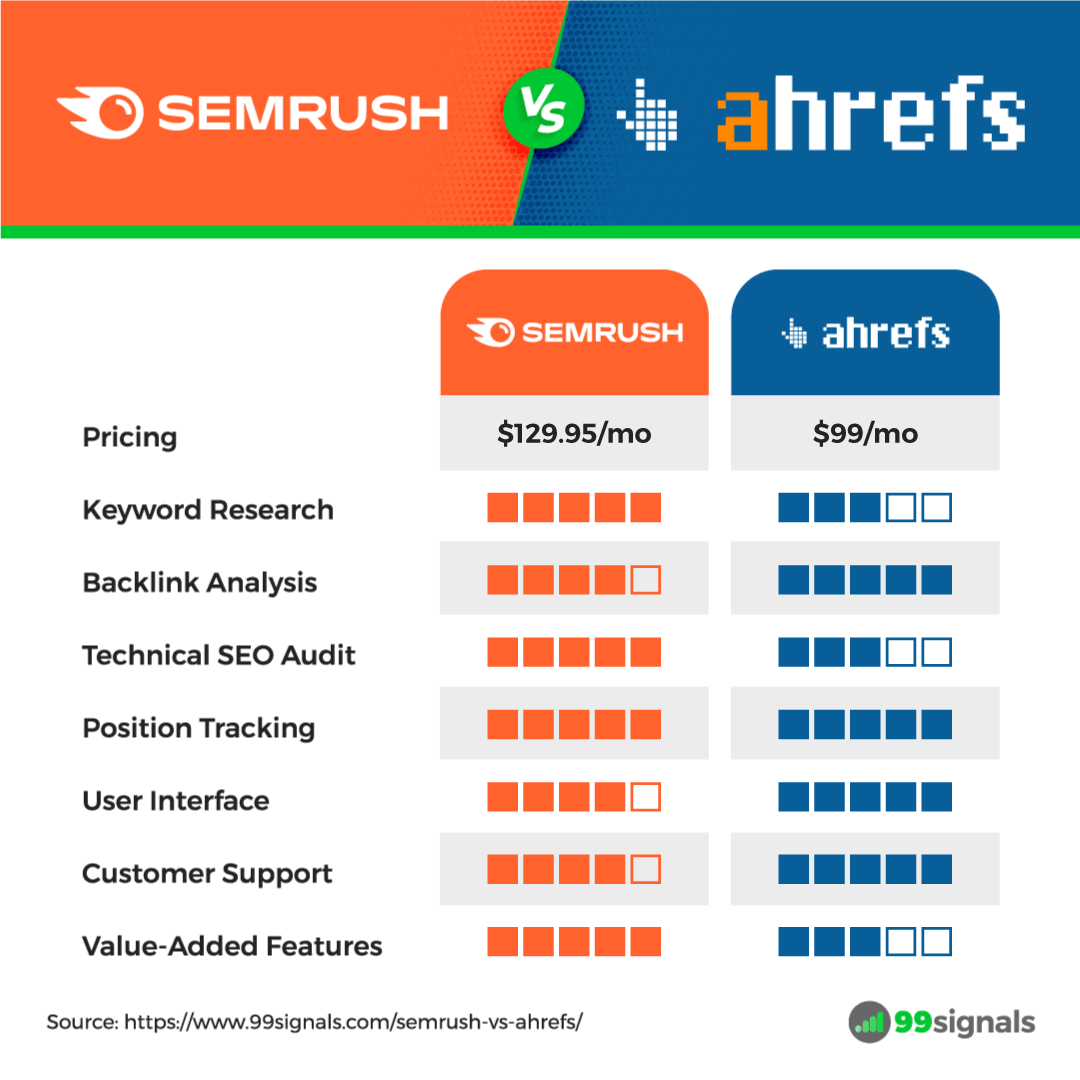
Semrush vs SpyFu: Which Tool is Better for Competitor Analysis?
Both
Semrush is an all-purpose SEO tool, while SpyFu is solely focused on competitive analysis. But even from a purely competitive research standpoint,
I explain the difference between these tools in this in-depth Semrush vs SpyFu comparison post. So if you want more details, I'd recommend you check out the post.
Here's a quick breakdown of how
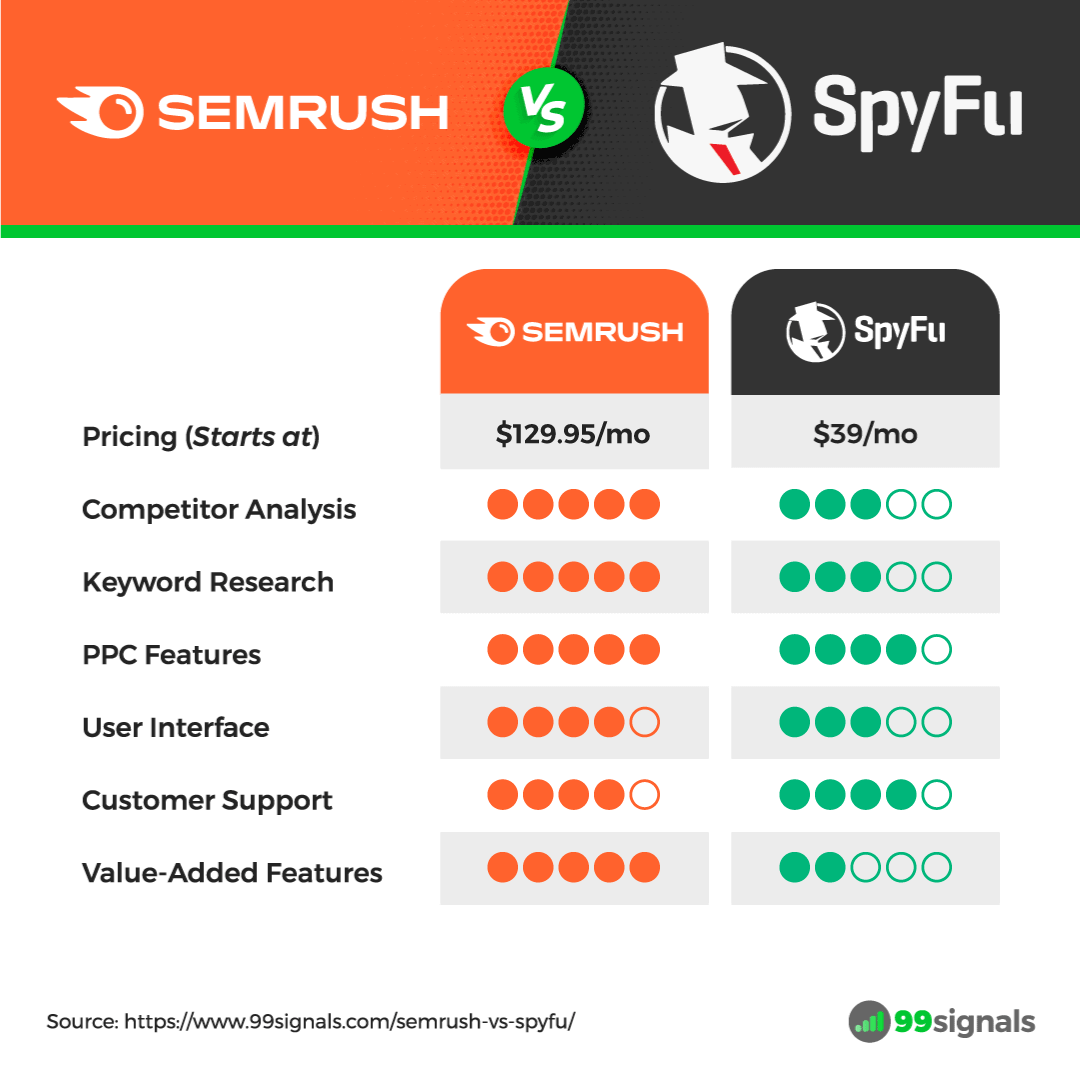
Semrush vs Moz: Is Semrush Better?
Semrush and Moz are often pitted against each other because they offer similar features. But that's where the similarities end.
Over the last few years,
Moz, on the other hand, looks and feels like a tool that's stuck in the past. Its UI is old, cluttered, and the SEO reports leave a lot to be desired. The free tools provided by Moz are still useful, but I don't think the tool is worth shelling out $100 a month.
For a more in-depth analysis, check out this Semrush vs Moz comparison post.
Below is a quick breakdown of how
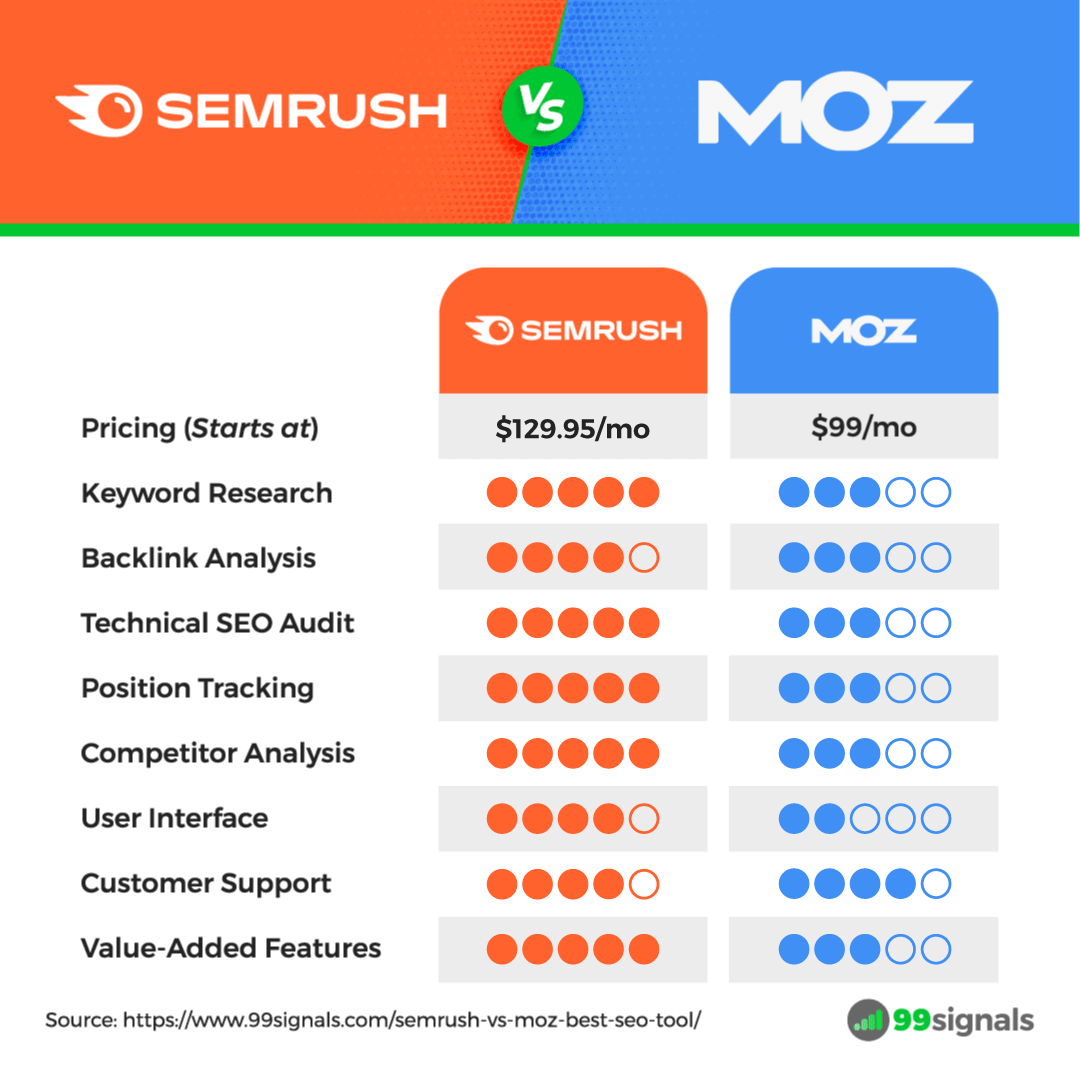
Try
Semrush FAQs
Let's wrap this post up by answering a few common questions about
Can I Use Semrush for Free?
Yes, you can use
That said,
This will give you full access to all of
What is SemrushBot?
SemrushBot is the search bot software deployed by
How Long is Semrush 's Free Trial?
Semrush's free trial on its Pro plan ($139.95/mo) lasts for 14 days.
The best part about
When was Semrush Founded?
Semrush was founded on 3 August 2008.
When Did Semrush Go Public?
Semrush went public on the New York Stock Exchange in March 2021. It's currently listed on Nasdaq as SEMR.
How Does Semrush Collect Data?
Semrush uses its own machine learning algorithms and trusted data providers to present the data. To learn more about how
Semrush uses Authority Score to measure the impact of a webpage or domain's links. It's similar to Domain Authority used by Moz and Domain Rating by Ahrefs.
What is Traffic Cost in Semrush ?
Traffic cost is an estimate of how much you'd spend on Google Ads to generate the same traffic you're currently getting from organic search. Traffic cost is one of the best SEO metrics to explain SEO's ROI in dollar value.
How Accurate is Semrush ?
Semrush is known for its high level of accuracy in SEO and digital marketing data.
While it provides reliable estimates for keyword data, competitor analysis, backlink and traffic analytics,
Regular updates and sophisticated algorithms ensure its data remains as accurate and current as possible, making it a trusted tool in the industry.
Final Verdict: Is Semrush Worth It?
Once you start using Semrush, it's easy to see why it's trusted by so many industry experts and influencers. The team behind
The only gripe I have with the tool would be its backlink analysis feature. It's been a chink in
So that wraps up my review of
Try
Did you find this
If you have any questions about
(Editor's Note: This review was originally published in May 2017 and has been updated regularly since then for relevance and comprehensiveness.)
Related Articles










[…] For a detailed review of SEMrush, check out this post. […]
This tool is very useful for my new website. Great review!
[…] weekly site audits using tools such as SEMrush or Serpstat to fix all SEO […]
You did a great job educating users in SEMRush. I've used it a couple years now and I love it. I am concerned though that since the SEMRush information is based on what they get from Google, that they may not be able to provide as much data as before concerning organic search. Do you have any insight on this?
Thanks for sharing information
If SEMRush is one of your go to tools that you use all the time why isn't its monthy cost included in your expense report on your monthly income report? I see AHrefs included.
I've subscribed to the SEMrush annual plan (Guru). Moreover, I use SEMrush predominantly for my agency clients. So I thought it wouldn't be fair to include it in expenses for 99signals. I use Ahrefs solely for this blog and that too only for backlink analysis and outreach purposes. A few other tools, such as BuzzSumo, ConvertKit, KWFinder, etc. are also not included in expenses because their usage is mostly restricted to my agency clients. Similarly, I don't include the agency income in my reports.
Semrush is a great tool with a lot of features in performing complete digital marketing activities. Thanks for an informative blog article.
Thanks, Christopher.
thank you for the great SEMrush walk-through. Very informative. I've just used your coupon (thanks for the great offer) and I can't wait to use that tool to boost my blog! Cheers! 🙂
Most of the SEMRush reviews are overwhelming because it has so many features but you focused on only 6 top features and made the article engaging. I read the whole article without getting bored.